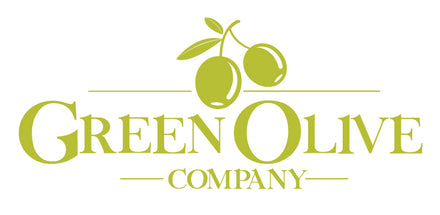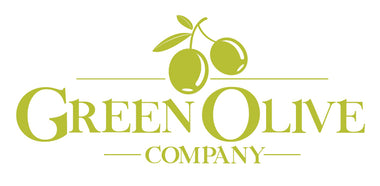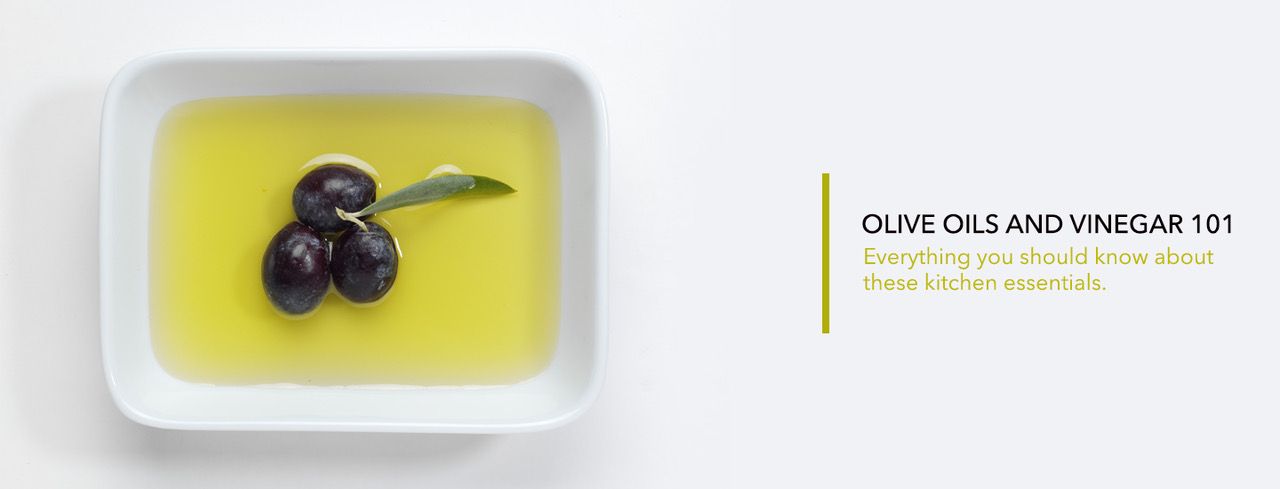
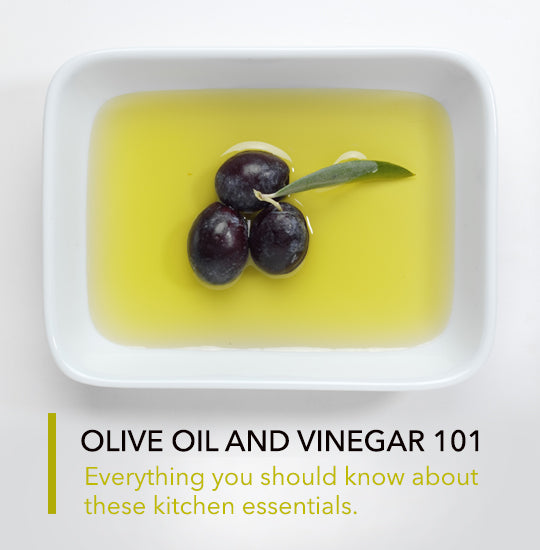
EXPAND YOUR KNOWLEDGE AND YOUR PALATE.
Extra virgin olive oil, commonly referred to as EVOO, and balsamic vinegar have become must-haves for healthy and flavorful cooking. Here we’ve put together a quick guide to help you get the most out of these fundamental fruit-based products.
WHAT IS BALSAMIC VINEGAR?
Balsamic vinegar is an aromatic, thick, dark, syrup-like aged type of vinegar made from the reduction of cooked grapes, whose fermentation process has been hindered. The unique condiment originated in Italy centuries ago but has only been embraced by the American palate over the past two decades. Unlike the sharp taste of vinegar, balsamic vinegar has a distinct rich flavor often described as sweet, bold, and complex, making it ideal for salad dressings, marinades, sauces, and dips.
Today, balsamic vinegar is one of the most popular condiments in grocery stores and specialty food retailers. The marked surge can be attributed to its remarkable taste and the health benefits associated with its natural ingredients.
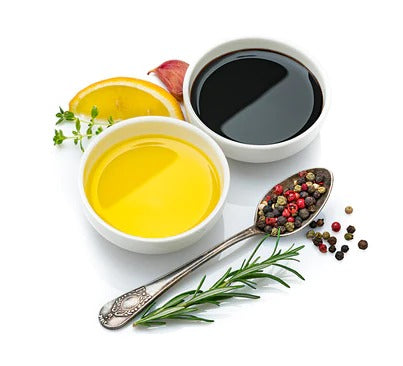
EXPAND YOUR KNOWLEDGE
Balsamic vinegar is low in sugar, saturated fat, and salt and contains antioxidants that destroy free radicals in the body. It retains most of the nutrients present in its parent grapes, including iron, calcium, potassium, and magnesium. The acetic acid and pepsin found in traditional balsamic vinegar aid in absorbing these minerals, of which calcium and magnesium are essential in forming strong, healthy bones. Studies suggest incorporating balsamic vinegar into your diet may include the following health benefits: Reduces blood sugar and protects against diabetes Can help lower cholesterol Can help reduces blood pressure (hypertension) Promotes healthy digestion Improves circulation Supports weight loss Improves skin health
HOW TO PROPERLY STORE BALSAMIC VINEGAR
You do not need to store your balsamic vinegar in the refrigerator unless that is your preference. Many people find that balsamic vinegar’s flavor is best revealed at room temperatures. It is always best to store balsamic vinegar in a dark place away from heat or natural sunlight. Balsamic vinegar typically has a long shelf life of about three to five years after being opened because of its high acidic content.

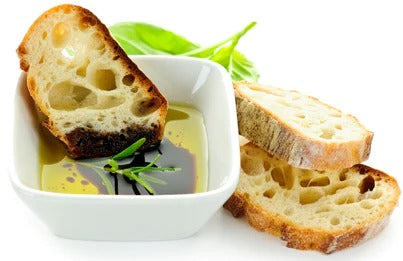
WHAT DOES “EXTRA VIRGIN” OLIVE OIL MEAN?
Extra virgin olive oil is considered superior to paler, more affordable virgin or refined versions of olive oils. Unlike virgin olive oil that often contains processed ingredients or chemicals, EVOO is made from pure, cold-pressed olives. Making EVOO is a time-consuming process that involves grinding olives into a paste and then pressing them to extract the oil. EVOO producers cannot just claim their products are “extra virgin.” They must be tested and certified by various agencies to meet standard chemical purity and sensory evaluation requirements to earn this high-quality label classification.
Green Olive Company’s extra virgin olive oils meet or exceed Ultra Premium (UP) standards that encompass the strictest chemistry, freshness, storage, and transportation requirements. UP is a new category of olive oil reserved only for the very finest olive oils in the world with variables that are objectively measured, quantified, and certified by Veronica Foods Company.
WHAT ARE FUSED AND INFUSED OLIVE OILS?
With the popularity of extra virgin olive oil exploding in recent years, the number of flavors being produced has also risen dramatically. Exciting varieties range from fused citrus lemon and orange to infused garlic, mushroom, and sage. How and when these appetizing ingredients are introduced to the oil defines whether they are fused or infused.
Fused olive oil
Fused olive oil is made by a laborious process known as “agrumato.” The mill method involves crushing whole, fresh, organic olives together with perfectly ripe, fresh produce using cold mechanical extraction. The flavor of the fruit is extracted at the same time as the olive oil is pressed, requiring a high level of craftsmanship and dedication to quality. You can view Green Olive Company’s top-selling fused olive oils here.
Infused olive oil
Infused olive oil is produced by adding herb and spice extracts after the olive oil has already been made. All of Green Olive Company’s infused olive oils start with premium EVOO and are blended in small batches with 100% organic ingredients. Some of our most popular infused olive oils include Basil Infused Olive Oil, Garlic Infused Olive Oil, and Tuscan Herb Infused Olive oil.
EXTRA VIRGIN OLIVE OIL HEALTH BENEFITS
Compared to other grades of olive oil or vegetable oils, extra virgin olive oil is rich in healthy monosaturated fats and natural antioxidants due to its high percentage of phenolic compounds. These polyphenols possess anti-inflammatory and anti-atherosclerotic properties that contribute to good health. Consuming EVOO regularly is believed to have a significant impact on your well-being:
- Helps reduces blood pressure (hypertension)
- Boosts the immune system
- Fights inflammation
- Protects against osteoporosis
- Balances blood sugar and protects against diabetes
- Aids in overall digestion
- Provides natural allergy relief
- Supports weight loss
- Strengthens healthy cell walls
- Boosts skin and hair health
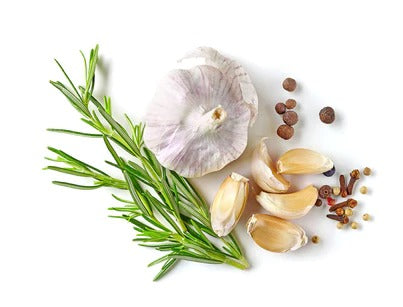
HOW TO PROPERLY STORE OLIVE OIL
Exposing olive oil to direct light, heat, or air will cause it to break down and go stale. Like many pantry essentials, olive oil can turn stale or even rancid when not adequately cared for.
Premium olive oils are typically sold in dark glass bottles that shield them from UV light. However, it’s still best to store your olive oil away from windows or fluorescent lighting in a dark cabinet or closet at room temperature.
Avoid storing olive oil near heat-producing sources like ovens or stovetops as heat will also damage its contents. Experts also agree that keeping olive oil in a refrigerator is not a good idea. Temperature fluctuations can cause condensation and a cloudy appearance.
Lastly, once you open a bottle, cap it back up quickly and tightly to minimize its exposure to oxygen.
Because olive oil tends to have a shelf life of about one year, it’s best to purchase it in small quantities regularly and pay attention to the harvest date.
